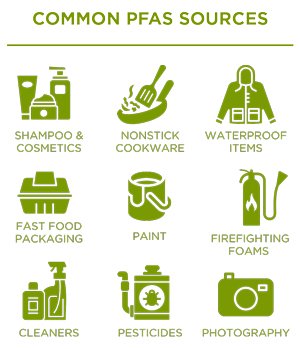
What is SC doing about toxic 'forever chemicals?'
This is an excerpt from the Fall/Winter 2022-2023 issue of the Upstate Advocate, Upstate Forever's twice-yearly publication. To read a digital copy of the complete publication, please click here.
Dear Ask An Advocate,
I was talking with my neighbor last week, and she said she’d just read an alarming article about toxic chemicals called “PFAS.” She said they cause all kinds of health problems and are found widely in our water supply. Is this true? And if so, can you tell me what Upstate Forever is doing about it? Clean water is very important to me, and I’d like to help.
Sincerely,
Worried in Walhalla
-----
Dear Unsure,
I’d like to tell you that PFAS — Per and polyfluoroalkyl substances — aren’t a danger, but the truth is that they are very toxic and are found widely throughout SC’s water supply. These chemicals have captured headlines for years due to the growing body of evidence of their toxicity to humans, and in particular to vulnerable populations such as developing children and pregnant women.
Why are PFAS so harmful?
 The durability of these “forever chemicals" centers around the carbon-fluorine bond, one of the strongest in chemistry, and a structure that makes them both water and oil repellent. This makes them extremely useful in manufacturing, but it also means they won’t break down in the environment.
The durability of these “forever chemicals" centers around the carbon-fluorine bond, one of the strongest in chemistry, and a structure that makes them both water and oil repellent. This makes them extremely useful in manufacturing, but it also means they won’t break down in the environment.
PFAS have been found to cause cancer, developmental issues in infants, liver and thyroid disease, hormone dysregulation, high cholesterol, and a decreased response to vaccines. Two of the most studied types of PFAS — PFOA and PFOS — are in the blood serum of 99% of Americans. This summer, the EPA released an updated health advisory for PFOA and PFOS, sparking frustration over the shockingly low levels deemed safe for children: less than one part per trillion, or the equivalent to one drop of water in 20 Olympic-size swimming pools.
While the EPA works to set drinking water standards for these chemicals, our water remains at risk from certain textile and plastics manufacturers, landfills, airports and military bases. These chemicals can even escape typical wastewater treatment plants and become concentrated in sludge that then gets applied to farmland as a budget fertilizer.
Whether you get your water from a private well or from a public drinking water provider, if your water source is located near one of these facilities, it is at risk. Don’t know where your water comes from or if it’s located near these types of facilities? Visit SCDES's online SC Watershed Atlas or simply ask your water utility.
What’s being done about PFAS in SC
Testing in August 2020 by SC DHEC (now SCDES) revealed widespread PFAS contamination in almost every public drinking water system sourced from lakes and rivers. More testing is needed to confirm risk to the public, but state funding is limited and is now being used to identify hot spots near suspected polluters.
In 2022, SC legislators responded to calls from concerned residents by creating a $10 million fund for water utilities and private well owners to assess and treat contamination from emerging contaminants like PFAS in their drinking water.
We have also seen leadership within the Upstate business community. Spartanburg’s Milliken & Company announced that it would phase out all PFAS-containing compounds from its textiles portfolio by December 31, 2022.
We applaud this action and hope it compels others in the business community to assess similar paths to prevent PFAS exposure to South Carolina communities.
You can help combat PFAS contamination
- Tell your legislator you want to prioritize the safety of our drinking water and are concerned about PFAS. Just by reaching out, you’re signaling that these issues matter to their constituents.
- Ask your water utility about the actions they have taken to assess the risks of PFAS in your drinking water. Few utilities have conducted testing for PFAS, and because these chemicals are unregulated, utilities don’t have to report what they find to SCDES or to the public. Encourage them to use new state and federal resources to complete their assessments and install treatment methods when needed.
- Sign up for Legislative Updates to be informed about opportunities to advocate for legislative action or other ways to make your voice heard.
Megan Chase-Muller is the Energy & State Policy Director for Upstate Forever. You can email her at mchase@upstateforever.org.
Got a question for one of UF's experienced advocates? Send us an email at info@upstateforever.org.
